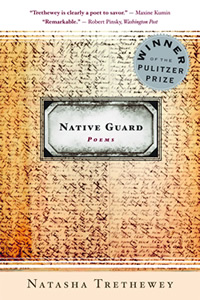Making a Necessity of Memory
Poet Natasha Trethewey talks about history, her work, her biracial identity, and the violence in her past
Poet Natasha Trethewey garnered critical praise with her first two collections, Domestic Work (2000) and Bellocq’s Ophelia (2002). Her third book, Native Guard, confirmed her as a leading American poet and won the 2007 Pulitzer Prize. Trethewey might be considered the quintessential New South writer. She is a native of Gulfport, Mississippi, born in 1966 to a black mother and a white father. The landscape and culture of the region are central to her poems. In Native Guard, she weaves together the history of a black Civil War regiment, the Louisiana Native Guards, with a troubling element of her personal history—the murder of her mother by her stepfather in 1985. As the poems recover and explore the past, they illuminate the present. Native Guard concludes with a series of poems about Trethewey’s experience as a biracial Southerner, in which she observes her own place in the history she has made it her mission to record: “I return / to Mississippi, state that made a crime / of me—mulatto, half-breed—native / in my native land, this place they’ll bury me.”
 Trethewey currently holds the Phillis Wheatley Distinguished Professor of Poetry at Emory University. She will be visiting Nashville to read at Vanderbilt University on March 19, 2015.
Trethewey currently holds the Phillis Wheatley Distinguished Professor of Poetry at Emory University. She will be visiting Nashville to read at Vanderbilt University on March 19, 2015.
Chapter 16: The poems in Native Guard contain multiple narratives. What are the difficulties and advantages of delivering a narrative through poetry rather than prose?
Trethewey: Because I deal with a fictionalized historical narrative in Native Guard, I have the advantage of relying less on evidence and more on speculation—historians have to rely more on evidence than those of us who are writing fictionalized historical narrative. I take liberties because my characters are imaginary characters who might have existed.
Chapter 16: A fascination with history is pervasive in your work. Do you ever think of yourself as a frustrated historian? Or do you think your poems are, in fact, a way of writing history?
Trethewey: Poetry can be a genre of history.
Chapter 16: As you craft your poems, is there is a different process for the poems that arise from your personal history, as opposed to those rooted in material from outside your own life? Do you have to wrestle more with the personal material to transform it into art?
Trethewey: I think I do wrestle more with the personal material to turn it into art. What is similar in both types of poems is that I rely on research for my writing. I turn outward to investigate history, in order to make sense of how my own life fits into the continuum of cultural, social, and labor histories.
Chapter 16: The landscape of the Gulf region is very much a part of your work. Would you say that your poetry is shaped in some essential way by your relationship to the geography of the region?
 Trethewey: Of course. Geography is fate. Henry James wrote, “Be tethered to native pastures even if it reduces you to a backyard in New York.” Or to a front yard in Gulfport, Mississippi.
Trethewey: Of course. Geography is fate. Henry James wrote, “Be tethered to native pastures even if it reduces you to a backyard in New York.” Or to a front yard in Gulfport, Mississippi.
Chapter 16: In your poem “South,” you claim your birthright, so to speak, as a Southerner, while in “Pastoral” you assert your place in the literary traditions of the South. You have spoken in interviews about the importance of recovering forgotten history. Do those two poems from Native Guard express a worry that the amnesia will continue—that without a deliberate effort, non-white voices in the future will still struggle to be heard?
Trethewey: Historical erasure and amnesia is an ongoing problem that society faces. This is always a danger. We have to recover, inscribe, and guard the memory of events as much as we can.
Chapter 16: You’ve received considerable recognition for your work, including a Pulitzer Prize. Is it more difficult to write without self-consciousness when you know your work will get a lot of critical scrutiny?
Trethewey: I try very hard to never to bring past successes or failures to my desk with me when I write. Because I was already working on another collection before winning the Pulitzer, I was already invested in it in a very exciting way. I don’t know that my anxiety is any different than it ever was. The worst criticism comes from myself.
Chapter 16: In an earlier interview, you said, “As a poet, I am always concerned about history and bearing witness to history.” That’s a very ancient notion of the poet’s role and seems at odds with much of what goes on in contemporary poetry. Are you engaged in a fundamentally different task from a poet who writes exclusively about his own experience, or who confines himself to the realities of his own time?
Trethewey: I don’t know that I would say it is a fundamentally different project. I think even poets who are making poems of their innermost experiences are still leaving us a document about a particular time and place.
Chapter 16: There seems to be a paradox in our culture about violence toward women. We talk about it a great deal as a social problem, but the individual women who suffer it seem to be largely invisible. Do you think of the poems about your mother as a kind of antidote to that scenario, or do you see them as entirely personal expressions of loss?
Trethewey: When I was writing the poems about my mother, they seemed very personal, as any elegy might. But an elegy is also a public thing. People in shelters see that book as chipping away at the invisibility factor, helping to make domestic violence a little less invisible. Native Guard also won an award from the organization Men Stopping Violence.
Chapter 16: What are you working on now?
Trethewey: My new collection is called Thrall. In it, I am interested in the language and iconography of empire as it relates to mixed-blood identity, to ideas of blood purity and impurity.
[This interview appeared originally on October 29, 2009.]

Maria Browning is a fifth-generation Tennessean who grew up in Erin and Nashville. A graduate of Mount Holyoke College, she has attended the Clothesline School of Writing in Chicago, the Moss Workshop with Richard Bausch at the University of Memphis, and the Sewanee Writers’ Conference. She lives in White Bluff.





